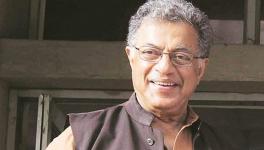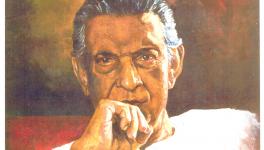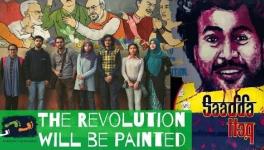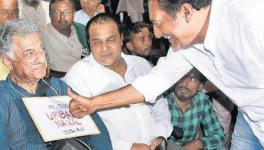“Human Beings Need Illusions to Go on Living”
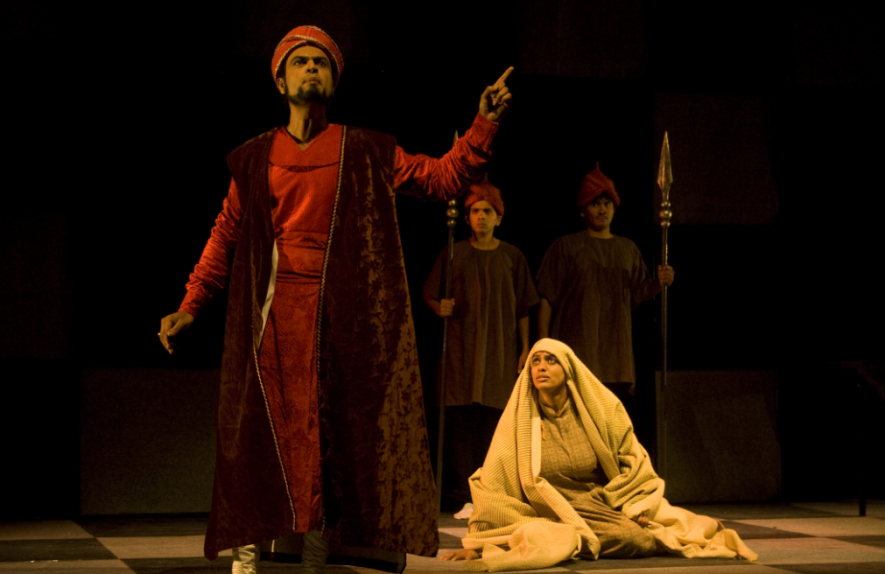
A scene from Tughlaq | Image Courtesy: Connected To India
“I do not know why unlike Ananthamurthy, Gauri Lankesh and Poornachandra Tejaswi of my generation, I have not involved myself in Kannada culture as they have. I do not know why. It has not been possible.”
Girish Karnad said this in a conversation with theatre director and activist, Prasanna and to writer U R Ananthamurthy recorded at Heggodu. He went on to say that when he left for England on Rhodes Scholarship his ambition was to become a celebrated poet in English. But his first play Yayati wrote itself in Kannada, much to his own surprise. He said that he then realised that “I am condemned to my language.” In the conversation he went on to find other reasons for his not being an insider, such as his being born a saraswat Brahmin etc. In my view, Karnad was not only condemned to his language but also to the myriad anxieties, ambiguities and the turbulence of post-Independence India, on which the final curtains were drawn recently. I have always found it curious that in Kannada/ Karnataka, there is the pressure on all writers to fit into a socially approved role. The pressure on the writer is to respond to all that happens, make their views public and make themselves visible to the politically correct sections. These sections are so sensitive about their own progressive image that they will brand the same writer as a renegade, a betrayer if they so much as utter a word against the politically correct line. In the same conversation Ananthamurthy says, “I wish I could write by avoiding what you see as a positive quality in me, Lankesh and Tejaswi.” I do not remember a single comment on Ananthamurthy’s statement. He was speaking of the anxieties of a writer who is also a public intellectual.
So it was clear to Karnad himself that the reception given to him and his writings in Kannada was not unproblematic. His arrival on the Kannada scene as an extraordinarily charismatic young man in his twenties, England-returned with an attractive job in an international publication house and "Yayati" a flawed, but brilliant first play was a phenomenon. He loved Dharwad and made forays into debates on modernist Kannada poetry and drama in the little magazines which used their cultural capital to establish literary modernity. But instead of debate, there were wry comments on his "Englishness" (read “lack of Kannadaness”). That he was a diligent scholar in many disciplines such as in theatre, history and political science remained practically unknown and many of his writings in English have remained unnoticed in the Kannada circles. It was an eclectic reading which made him go beyond the popular received notions of Indian history, the Bhakti movement and of “Indian Values”.
Does not the play "Tughlak" show a studied indifference to the communalised notions of medieval history? His hero-villain Tughlak is himself the site of a hundred contradictions. But he has nothing to do with the right-wing recriminations of “Muslim fanaticism”. In T"ipu Sultan’s Dreams", Tipu is bigger and greater than the imperialist and so-called historical constructions of his personality. In "Taledanda", the 12th century Vachanakara leader of the radical Basavanna movement is such a complex figure that he cannot be appropriated by the dominant community for whom he is the religious icon today. There are reams of academic and popular histories written on the Vijayanagar empire as the great Kannada-Hindu empire ground to dust by Muslim invaders. Karnad’s last play on the fall of Vijayanagar, Rakshasa-Tangadi demolishes many such myths by showing that what lay at the centre of it all was power and the illusion of power. The secular-minded, Sufi follower Sultan of Bijapur is as much as victim of the game of power as Aliya Ramaraya, the de-facto ruler of Vijayanagar. Such an understanding of history is political in the highest sense of the word. If politics is the effort to change our understanding and attitudes towards the past and the present, Girish Karnad’s plays are political. I attribute great importance to the fact that this understanding shaped his plays which received enthusiastic reception in many bhashas of India. They become a part of the educated imagination of at least two generations. They achieved far more than our endless debates and speeches made to an already converted left-leaning audience. As Karnad said many times, for him drama was a collective experience and that even modernist Kannada theatre should grow away from “Company drama” (professional Kannada theatre). His talks and essays on Indian drama and theatre offer a very informed analysis of theatrical traditions and threw light on his own endless experimentation and innovations. Before Karnad, T P Kailasam and Sriranga had introduced the realistic, proscenium theatre in Kannada which was urban-centric and amateur, played by small groups for a small audience. Kailasam and Sriranga had ridiculed and written spoofs on company theatre which was then in decline after enjoying decades of glorious existence as the major collective form of popular culture.
As Shankar Mokashi Punekar argued, inadvertently they caused a disjuncture by relegating company drama to inane entertainment and making amateur drama “serious” and artistic. Karnad used many techniques of professional drama and also used the repertoire of folk drama (as in "Hayavadana" and "Naga Manadala"). He could not, just as no other dramatist could retrieve to the collective experience which traditional drama had provided to most sections of society. Karnad consciously and squarely confronted the challenge for the Indian dramatist to discover a suitable form to communicate his sensibility shaped by the west as well as by his own experience of living in post-colonial Indian society. For a dramatist like Kambar, totally immersed in the folk-oral traditions, the complete theatre of poetry, song, dance and a uniquely structured frame of time and space was available. It could reach a wider audience, though it must be said like all post-Independence playwrights Kambar had to address a predominantly urban and modern audience.
It would be far more appropriate to see Karnad as one among the many brilliant Indian playwrights who made Indian theatre contemporary in the real sense of the word post-1960. Badal Sarkar, Vijay Tendulkar, Mahesh Ekkunehvar, Utpal Datt and Habib Tanvir whose plays found equally gifted directors like Ebrahim Alkazi, B V Karanth, Vijaya Mehta, Satyadev Dube and others and created an extraordinary body of dramatic work. These plays were sharply critical of orthodoxy, hypocritical middle class morality, vestiges of feudal oppression, gender-centric violence and the caste system. They created a vibrant theatre which was experimental and self-reflexive. It is in this ambience that Karnad’s historical and mythological plays also acquired a political edge, "Tughalak" remaining probably the most trenchant critique of political power divorced from human concerns as well as of an authoritarian personality. "Fire and Rain" is a frightening portrayal of knowledge as power as an unethical end in itself. "Taledanda", among many other things, is about the tragic career of a radical revolution. Paralleling the socio-political world is the world of human passions and relationships which are also fraught with power and violence. I can think of very few playwrights who have probed into the pervasiveness of power even in the most intimate human relationships with such consistency. Karnad seemed to work on the premise that “humankind cannot hear very much reality” and in play after play he probed into the delusions, cruelty, aggressiveness which characterise human relationships. A memorable line which occurs in at least two plays is “Human beings need illusions to go on living."
That a playwright like Karnad with such deep (and dark?) philosophical concerns should have his plays performed in many bhasha theatres, innumerable times is a tribute both to the Indian audience and the genius of Girish Karnad.
Get the latest reports & analysis with people's perspective on Protests, movements & deep analytical videos, discussions of the current affairs in your Telegram app. Subscribe to NewsClick's Telegram channel & get Real-Time updates on stories, as they get published on our website.









